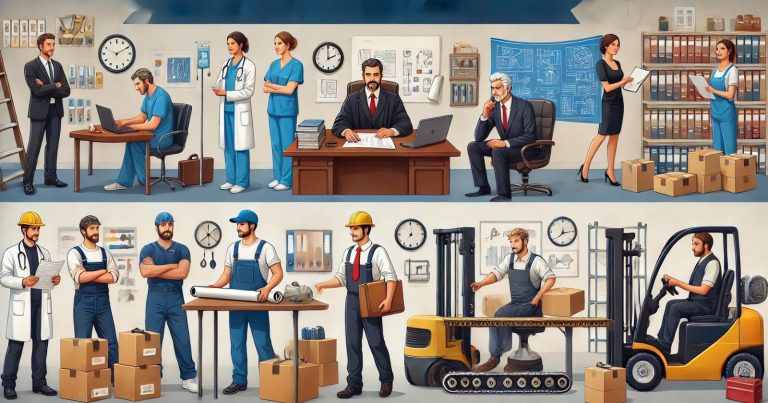The debate of profession vs occupation is very important to be understood by students and job seekers in order to make better career choices. The fundamental difference between occupation and profession is that a profession is specialized in education and training, but an occupation comprises any kind of economic activity. A doctor, lawyer, or engineer belongs to a profession, while a shopkeeper, driver, or factory worker falls under an occupation. Knowing the difference between Profession vs Occupation provides a base for proper career choices concerning education, skills, and income.
What is Profession?
A profession requires particular abilities, knowledge, and experience to perform activities in a specific field. Professions demand extreme dedication, training, and knowledge. They relate to applying knowledge from theory and are standardised or codified by rules or codes of conduct issued by the mother institute.
Apart from being regulated by professional bodies or organisations that monitor ethical standards and legal processes, professions usually require the achievement of professional licenses or certificates of practice. Some examples of occupations include chartered accountants, company secretaries, cost management accountants, architects, doctors, lawyers, engineers, etc.
Features of Profession
The features of profession, which separate it from other occupations include specialised education, ethical standards, and ongoing learning. Professionals are subject to strict regulations and aim to offer expert services to society.
- Specialised Knowledge and Training: A profession requires formal education and practical training. Doctors, lawyers, and engineers spend years studying and practising before starting their careers.
- Service-oriented: Professions are about providing service to society rather than only making money. Example: A doctor heals the patients, and a teacher teaches the students.
- Ethical Standards and Codes of Conduct: All professionals have some definite standards of ethics. Lawyers, for instance, are governed by law ethics, and medical professionals by medicine ethics.
- Gov’t by Professional Bodies: Profession-specific governing bodies enforce rules and even issue licenses to practice the profession. For example, the Indian Bar Council oversees lawyers and medical professionals, which the Indian Medical Council governs.
- Continuous Learning and Development: Professionals update their knowledge through training, seminars, and research. Example: IT professionals learn new technologies to stay updated.
What is Occupation?
Occupation is the term that has been used to refer to the main or consistent source of job activity generating income. Occupation, in general, tends to centre on particular jobs that individuals gain a living from. Occupations are applied in a wider use, encompassing an extensive scope of roles, skills, and sectors.
Occupation may include work in any field, such as health, manufacturing, retail, etc. Occupations can be pursued with high education and training, and the job type requires formal qualifications or specialised expertise to pursue occupation.
Features of Occupation
The features of occupation outline the broad scope as it embraces many jobs which may not need formal education or licensing. The source of income in occupations can be wages, salaries, or business profits. They can also be flexible or temporary, depending on the availability of jobs.
- No Specific Educational Requirement: Most professions do not have a specific requirement for formal education. Example: A tailor, shopkeeper, or factory worker may not need specialised education.
- Source of Income: An occupation provides income through wages, salaries, or business profits. Example: A taxi driver earns by providing transport services.
- No Government Body or License Requirement: No jobs require a license or professional approval. Example: The fruit seller is not licensed; he only sells fruits.
- Varied skill levels: Ranging from the unskilled jobs of laborers to highly skilled jobs like software engineers. For example, a factory worker and an electrician have occupations but require different skill levels.
- Flexible and Transient: People change jobs often according to the availability of jobs and their financial requirements. Example: A worker may shift from being a delivery agent to working in a retail shop.
Difference Between Occupation and Profession
This understanding is vital for choosing a career because there is a difference between an occupation and a profession. Differences between occupation and profession are mainly based on education, regulation, income, and responsibilities. Here is a comparison in detail:
Definition
A profession is another term for a career that needs special education or training. These people learn formal education and attain expertise in that field for which they undertake years of training to develop this knowledge and thus become experts in their work.
An occupation is a type of work or business that assists a person in providing income. Some occupations require talent, while others do not require formal training. People working in professions can quickly shift jobs and could attend work in varying industries without the requirement for special education.
Education
Professions require formal education and training. A doctor, a lawyer, or an engineer is expected to attend university and acquire professional courses. Such education and training help doctors, lawyers, and engineers master their field well, making them experts in delivering expert services.
Formal education may or may not be necessary for occupations. Many occupations require only basic training, such as factory work or driving. Others, like shopkeeping, are learned through experience rather than through school. Individuals can enter occupations quickly without spending years in education.
Regulation
Strict rules of professional bodies guide professionalism. Doctors require a medical license to practice, while lawyers must pass exams before working. These laws ensure that the professionals provide quality and safe services.
Occupations have no governing rules or bodies. A shopkeeper does not require special permission to work as a driver, a factory worker, etc. So he does not need to pass professional exams or follow rigid rules to start his job.
Objective
The main aim of a profession is to offer expertise and service. Professionals seek to improve their skills and offer the best solutions possible in their area of practice. Their work may affect other people’s lives, like a doctor curing patients or a lawyer assisting clients.
Occupation and jobs had the main point of making a living from their occupation. They work to obtain money and their families. For this, no person requires deep study or advanced practice; however, his or her employment is the leading cause of success in society.
Examples
Some of the most common professions are doctors, lawyers, teachers, and engineers. These careers take years of study and specialised training. Professionals acquire knowledge through education and continue to learn throughout their careers.
Shopkeepers, drivers, and factory workers are examples of some jobs. Such jobs earn wages directly and rarely require education. Individuals can quickly get into such jobs and learn from work.
| Aspect | Profession | Occupation |
| Definition | A career requiring specialized education and training. | Any work or business that provides income. |
| Education | Requires formal education and training. | May or may not require education. |
| Regulation | Governed by professional bodies. | No formal governing authority. |
| Objective | Focuses on service and expertise. | Focuses on earning a livelihood. |
| Examples | Doctors, lawyers, teachers, engineers. | Shopkeepers, drivers, factory workers. |
Profession vs Occupation FAQs
What is the difference between occupation and profession?
Occupation vs Profession, A profession is something that involves specialised educational training, but an occupation may refer to any form of earning or income-generating activity.
What are some examples of profession vs occupation?
Profession: Doctor, Lawyer, Chartered Accountant. Occupation: Shopkeeper, Farmer, Delivery Agent.
Why is a profession considered more specialised than an occupation?
A profession requires years of studies, certification, and training. However, an occupation might not necessarily need formal training.
Can an occupation become a profession?
Yes. More education and training may make an occupation become a profession. For example, a hospital assistant will turn into a qualified doctor after higher studies.
How does profession vs occupation impact career growth?
A profession ensures the employee enjoys long-term stability, better pay, and potential for career advancements, while the occupation can provide only short-term or fluctuating income.


